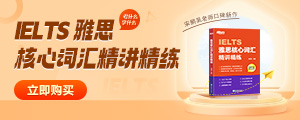
雅思免费课程NEW
剑桥题库机考HOT
雅思水平测试NEW
雅思选课中心
雅思听力
雅思口语
雅思阅读
雅思写作
雅思问答
雅思考试机经回忆
雅思动态NEW
雅思备考指导
雅思模拟题
雅思核心词汇NEW

雅思备考规划
扫码添加助教免费咨询雅思备考规划

扫码关注回复雅思获取最新雅思口语题库和备考资料
新东方在线雅思网第一时给大家带来了雅思阅读练习题:智力的开端,希望以下内容能够为同学们的雅思备考提供帮助。新东方在线雅思网将第一时间为大家发布最新、最全、最专业的雅思报名官网消息和雅思考试真题及解析,供大家参考。
The beginning of intelligence
A No one doubts that intelligence develops as children grow older. Yet the concept of intelligence has proved both quite difficult to define in unambiguous terms and unexpectedly controversial in some respects. Although, at one level, there seem to be almost as many definitions of intelligence as people who have tried to define it, there is broad agreement on two key features. That is, intelligence involves the capacity not only to learn from experience but also to adapt to one's environment. However, we cannot leave the concept there. Before turning to what is known about the development of intelligence, it is necessary to consider whether we are considering the growth of one or many skills. That question has been tackled in rather different ways by psychometricians(心理测量师)and by developmentalists.
B The former group has examined the issue by determining how children's abilities on a wide range of tasks intercorrelate, or go together. Statistical techniques have been used to find out whether the patterns are best explained by one broad underlying capacity, general intelligence, or by a set of multiple, relatively separate, special skills in domains such as verbal and visuospatial ability. While it cannot be claimed that everyone agrees on what the results mean, most people now accept that for practical purposes it is reasonable to suppose that both are involved. In brief,the evidence in favour of some kind of general intellectual capacity is that people who are superior (or inferior) on one type of task tend also to be superior (or inferior) on others. Moreover, general measures of intelligence tend to have considerable powers to predict a person's performance on a wide range of tasks requiring special skills. Nevertheless, it is plain that it is not at all uncommon for individuals to be very good at some sorts of task and yet quite poor at some others.
C Furthermore the influences that affect verbal skills are not quite the same as those that affect other skills. This approach to investigating intelligence is based on the nature of the task involved, but studies of age-related changes show that this is not the only, or necessarily the most important, approach. For instance, some decades ago, Horn and Cattell argued for a differentiation between what they termed 'fluid' and 'crystallised' intelligence. Fluid abilities are best assessed by tests that require mental manipulation of abstract symbols. Crystallised abilities, by contrast, reflect knowledge of the environment in which we live and past experience of similar tasks; they may be assessed by tests of comprehension and information. It seems that fluid abilities peak in early adult life, whereas crystallised abilities increase up to advanced old age.
D Developmental studies also show that the interconnections between different skills vary with age. Thus in the first year of life an interest in perceptual patterns is a major contributor to cognitive abilities, whereas verbal abilities are more important later on. These findings seemed to suggest a substantial lack of continuity between infancy and middle childhood. However, it is important to realize that the apparent discontinuity will vary according to which of the cognitive skills were assessed in infancy. It has been found that tests of coping with novelty do predict later intelligence. These findings reinforce the view that young children's intellectual performance needs to be assessed from their interest in and curiosity about the environment, and the extent to which this is applied to new situations, as well as by standardised intelligence testing.
E These psychometric approaches have focused on children’s increase in cognitive skills as they grow older. Piaget (著名儿童教育学家) brought about a revolution in the approach to cognitive development through his arguments (backed up by observations) that the focus should be on the thinking processes involved rather than on levels of cognitive achievement. These ideas of Piaget gave rise to an immense body of research and it would be true to say that subsequent thinking has been heavily dependent on his genius in opening up new ways of thinking about cognitive development. Nevertheless, most of his concepts have had to be so radically revised, or rejected, that his theory no longer provides an appropriate basis for thinking about cognitive development. To appreciate why that is so, we need to focus on some rather different elements of Piaget’s theorising.
F The first element, which has stood the test of time, is his view that the child is an active agent of learning and of the importance of this activity in cognitive development. Numerous studies have shown how infants actively scan their environment; how they prefer patterned to non-patterned objects, how they choose novel over familiar stimuli, and how they explore their environment as if to see how it works. Children's questions and comments vividly illustrate the ways in which they are constantly constructing schemes of what they know and trying out their ideas of how to fit new knowledge into those schemes or deciding that the schemes need modification. Moreover, a variety of studies have shown that active experiences have a greater effect on learning than comparable passive experiences. However, a second element concerns the notion that the development proceeds through a series of separate stages that have to be gone through step-by-step, in a set order, each of which is characterized by a particular cognitive structure. That has turned out to be a rather misleading way of thinking about cognitive development, although it is not wholly wrong.
Questions 14-17
Choose the correct letter, A, B, C, or D.
Write your answers in boxes 27-30 on your answer sheet
14 Most researchers accept that one feature of intelligence is the ability to
A change our behaviour according to our situation.
B react to others' behaviour patterns.
C experiment with environmental features.
D cope with unexpected setbacks.
15 What have psychometricians used statistics for?
A to find out if cooperative tasks are a useful tool in measuring certain skills
B to explore whether several abilities are involved in the development of intelligence
C to demonstrate that mathematical models can predict test results for different skills
D to discover whether common sense is fundamental to developing children's abilities
16 Why are Horn and Cattell mentioned?
A They disagreed about the interpretation of different intelligence tests.
B Their research concerned both linguistic and mathematical abilities.
C They were the first to prove that intelligence can be measured by testing a range of special skills.
D Their work was an example of research into how people's cognitive skills vary with age.
17 What was innovative about Piagct's research?
A He refused to accept that children developed according to a set pattern.
B He emphasised the way children thought more than how well they did in tests.
C He used visually appealing materials instead of traditional intelligence tests.
D He studied children of all ages and levels of intelligence.
Questions 18-22
Do the following statements agree with the information given in Reading Passage 3?
In boxes 31-36 on your answer sheet, write
YES if the statement is true
NO if the statement is false
NOT GIVEN if the information is not given in the passage
18 A surprising number of academics have come to the same conclusion about what the term intelligence means.
19 A general test of intelligence is unlikely to indicate the level of performance in every type of task.
20 The elderly perform less well on comprehension tests than young adults.
21 We must take into account which skills are tested when comparing intelligence at different ages.
22 Piaget's work influenced theoretical studies more than practical research.
Questions 23-26
Complete the summary using the list of words, A-1, below.
Write your answers in boxes 37-40 on your answer sheet.
Researchers investigating the development of intelligence have shown that 23 skills become more significant with age. One good predictor of 24 intelligence is the degree to which small children are 25 about their surroundings and how much interest they show on finding themselves in an 26 setting.
A adult B practical C verbal
D spatial E inquisitive F uncertain
G academic H plentiful I unfamiliar
参考译文:
早期的智商研究
A 没有人会质疑随着儿童的成长,他的智商也会相应地得到发展。对于“智商”这个概念,既是很难用准确的术语定义,也没有想到会在很多方面存在争议。尽管从某种水平上来讲,已经有很多关于智商的不同的定义,因为总是有很多人想要给它下定义.但是有两点是人们普遍赞同的。也就是说,智商不仅包括从经验中学习的能力还包括适应环境的能力。但是,它的概念远不止这些,在谈论关于智商的发展之前,有必要先考虑一下若干技巧的成熟,而这个问题被心理测量师和发展心理学家以不同的方式在进行着研究。(第31题,27题)
B 前者通过测试儿童在一系列不相关的任务的完成能力来进行研究。他们使用了统计技术来最好地解释是否存在一种广泛存在的能力,也就是普遍智商,或是一系列相对独立特殊的技能存在于像口头和视觉空间方面。但是并不是每个人都接受研究结果的含义,大多数人认为处于实践方面的意义,上述两者应该是并存的,这样的解释才是合理的。简而言之,一些支持普遍智商存在的证据体现在在一种任务的完成过程中表现出色(或逊色)的人往往在完成其它任务时也更胜一筹(或更差一些)。此外,普遍智商的测量可以在很大程度上预计出一个人在一系列其它需要特定技能的任务中的表现。然而,很显然,也有可能尽管有的人在某些方面很出色,但是在其它方面很吃力。(第28题,32题)
C 会对口语方面造成的影响和对其它方面的影响不太一样。研究智商的方法是基于任务本身的性质的,但是对于年龄相关的智商的变化表明这不是唯一的或是一定是最重要的方法。比方说,几十年前,Horn和Cattell—直在争论他们所谓的“流动智商”和“固定智商”之间的区分,流动智商是依据对大脑控制抽象符号的能力来测量的,而固定智商是通过针对理解和信息的测试来衡量的。似乎流动智商在人刚成年的时候达到顶峰(peak in),而固定智商会随着年龄的增加而增长(advanced)。(第 29 题,33 题)
D 发展学的研究也表明不同的技巧之间的相互关联随着年龄的变化而变化。因此在人一岁的时候,对于感知类型方面表现出的兴趣是认知能力提高的一个重要因素,但是之后其对口头能力方面的影响更大。这些研究结果似乎表明婴儿和童年初期之间缺乏一个连续性。但是要意识到这种明显的不连续性会因测量的婴儿的能力的不同而变化。已经发明出了通过创新来预测成年之后(later)的智商的测试。一直以来,人们认为需要通过测验儿童对环境表现出来的兴趣和好奇心以及他们对于陌生环境能应用出来的程度以及标准智力测试的评估来衡量儿童的智力表现,而这些研究结果则加强了这种看法。(第37-40题)
E 这些心理测量的方法着重在儿童在年龄增长时所伴随的认知技巧的提高。皮亚杰(著名儿童教育学家)却在这个领域掀起了一场革命,他认为,焦点应该集中在儿童的思维(thought)过程而不是认知(did)的水平。(第30题)皮亚杰的观点引发了大量的研究,可以说是他开的先河才导致了后续人们对于思维认知发展方向的研究。然而因为他所提出的大多数的概念己经从根本上被改变了或是被否定了,以至于他的理论不再对儿童认知发展的研究提供合理的基础支持。(第35题 NOT GIVEN)
F 他理论的第一个方面经受住了时间的检验:儿童是积极学习的主体,而这对于认知发展是非常重要的。(第36题,他的理论并没有完全被认为一无是处discredited…)无数的研究已经表明婴儿就已经开始积极地观察周围的环境,他们倾向于选择有固定模式的事物,他们会因为家人的刺激而选择新鲜事物,他们积极地探索环境是为了弄明白周围的世界是怎么运转的。儿童的问题和对事物的评论生动地展示了他们一直在构建自己已知事物的模式,并且试图将新的知识融入到这个模式中,或是认为这个模式需要修正。此外,一系列的研究表明主动的经验要比被动的经验在学习方而有更大的影响。但是他理论的第二个方面:认为儿童认知的发展是分为若干独立的阶段,而且这些阶段要以固定的顺序逐一地经过,而每一个阶段都有一个特定的认知结构——被证明是一个在研究认真发展方而相当误导人的方法,尽管它并不是一无是处。
本文关键字: 雅思阅读

 资料下载
资料下载
雅思写作高频词汇PDF下载
发布时间:2023-08-26添加新东方在线雅思助教号
回复【200】获取
590组雅思阅读写作必背短语PDF版下载
发布时间:2023-08-09添加新东方在线雅思助教号
回复【590】获取
雅思学术词汇搭配表PDF版下载
发布时间:2023-08-04添加新东方在线雅思助教号
回复【ACL】获取
雅思口语part3结构策略PDF版下载
发布时间:2023-08-04添加新东方在线雅思助教号
回复【Part3】获取
雅思听力高频场景词PDF版下载
发布时间:2023-08-09添加新东方在线雅思助教号
回复【高频词】获取
雅思口语Part2答案示范15篇PDF下载
发布时间:2023-07-26添加新东方在线雅思助教号
回复【P2】获取
雅思小作文35组必备表达PDF下载
发布时间:2023-07-26添加新东方在线雅思助教号
回复【35】获取
雅思阅读高频短语PDF下载
发布时间:2023-07-20添加新东方在线雅思助教号
回复【短语】获取
200组雅思写作高频词汇PDF下载
发布时间:2023-07-20添加新东方在线雅思助教号
回复【200】获取
雅思写作话题词汇PDF下载
发布时间:2023-07-16添加新东方在线雅思助教号
回复【话题】获取
50组雅思口语同义替换词PDF下载
发布时间:2023-07-10添加新东方在线雅思助教号
回复【替换】获取
雅思写作大作文精选题目101PDF下载
发布时间:2023-07-09添加新东方在线雅思助教号
回复【101】获取
雅思口语核心300词PDF下载
发布时间:2023-06-23添加新东方在线雅思助教号
回复【300】获取
雅思阅读分类词汇PDF下载
发布时间:2023-06-17添加新东方在线雅思助教号
回复【分类词】获取
雅思口语必备习语PDF下载
发布时间:2023-06-17添加新东方在线雅思助教号
回复【习语】获取
雅思小作文常用词汇66词PDF下载
发布时间:2023-06-16添加新东方在线雅思助教号
回复【66】获取
雅思口语常见功能结构109句PDF下载
发布时间:2023-06-08添加新东方在线雅思助教号
回复【109】获取
10年雅思写作题库PDF下载
发布时间:2023-06-08添加新东方在线雅思助教号
回复【写作话题】获取
雅思图表作文精选套句50句PDF下载
发布时间:2023-05-28添加新东方在线雅思助教号
回复【50】获取
雅思写作99组高频词汇PDF资料
发布时间:2023-05-28添加新东方在线雅思助教号
回复【99】获取
2023年5月雅思口语新题题库PDF版本
发布时间:2023-05-14添加新东方在线雅思助教号
回复【新题】获取
2023年5-8月雅思口语新题题库与解析PDF版本
发布时间:2023-05-06关注新东方在线考雅课程中心服务号
回复【新题】获取
雅思听力考点词汇PDF资料
发布时间:2023-04-27添加新东方在线雅思助教号
回复【考点词】获取
雅思听力机经词汇PDF资料
发布时间:2023-04-24添加新东方在线雅思助教号
回复【TL】获取
雅思口语Part1常见话题语料库PDF资料
发布时间:2023-04-20添加新东方在线雅思助教号
回复【Part1】获取
剑桥雅思阅读长难句50句PDF资料
发布时间:2023-04-19添加新东方在线雅思助教号
回复【长难句】获取
雅思阅读核心学术词汇表PDF资料
发布时间:2023-04-07关注新东方在线考雅课程中心服务号
回复【核心】获取
100个雅思写作观点词和替换词表达PDF资料
发布时间:2023-03-24关注新东方在线考雅课程中心服务号
回复【100】获取
雅思阅读分类词汇PDF资料
发布时间:2023-03-22关注新东方在线考雅课程中心服务号
回复【分类词】获取
雅思阅读短语PDF资料
发布时间:2023-03-08关注新东方在线考雅课程中心服务号
回复【短语】获取

添加新东方在线雅思助教,
回复【口语】获取雅思口语资料大礼包

 推荐阅读
推荐阅读
在雅思阅读备考中,考生可以提前准备一些在考试场中可能会用到的应试技巧。接下来小编为大家分享雅思阅读临场经验和应试技巧,希望能为
来源 : 网络 2021-01-06 14:53:27 关键字 : 雅思阅读
在雅思阅读备考中,考生想要快速的取得进步,那么就需要结合一定的方法和技巧,往正确的方向努力。接下来小编为大家带来的是雅思阅读准
来源 : 网络 2021-01-06 14:52:33 关键字 : 雅思阅读
在雅思阅读备考中,填空题属于经典题型,但是这类题型也有一定难度,很多考生在这类题型上容易丢失分数。接下来小编给大家带来的是雅思
来源 : 网络 2021-01-05 14:32:45 关键字 : 雅思阅读
在雅思阅读考试中,考生可以通过一些实战技巧,帮助我们在考试中有一个更好的发挥。接下来小编为大家分享雅思阅读考试高分实战技巧,希
来源 : 网络 2021-01-05 14:31:40 关键字 : 雅思阅读
雅思阅读考试对考生来说有一定难度,很多考生在时间上出现问题,导致答不完题,时间不够用,其实这些情况我们都是可以改善的,那么如何
来源 : 网络 2021-01-04 15:09:13 关键字 : 雅思阅读





 资料下载
资料下载
添加新东方在线雅思助教号
回复【200】获取
添加新东方在线雅思助教号
回复【590】获取
添加新东方在线雅思助教号
回复【ACL】获取
添加新东方在线雅思助教号
回复【Part3】获取
添加新东方在线雅思助教号
回复【高频词】获取
添加新东方在线雅思助教号
回复【P2】获取
添加新东方在线雅思助教号
回复【35】获取
添加新东方在线雅思助教号
回复【短语】获取
添加新东方在线雅思助教号
回复【200】获取
添加新东方在线雅思助教号
回复【话题】获取
添加新东方在线雅思助教号
回复【替换】获取
添加新东方在线雅思助教号
回复【101】获取
添加新东方在线雅思助教号
回复【300】获取
添加新东方在线雅思助教号
回复【分类词】获取
添加新东方在线雅思助教号
回复【习语】获取
添加新东方在线雅思助教号
回复【66】获取
添加新东方在线雅思助教号
回复【109】获取
添加新东方在线雅思助教号
回复【写作话题】获取
添加新东方在线雅思助教号
回复【50】获取
添加新东方在线雅思助教号
回复【99】获取
添加新东方在线雅思助教号
回复【新题】获取
关注新东方在线考雅课程中心服务号
回复【新题】获取
添加新东方在线雅思助教号
回复【考点词】获取
添加新东方在线雅思助教号
回复【TL】获取
添加新东方在线雅思助教号
回复【Part1】获取
添加新东方在线雅思助教号
回复【长难句】获取
关注新东方在线考雅课程中心服务号
回复【核心】获取
关注新东方在线考雅课程中心服务号
回复【100】获取
关注新东方在线考雅课程中心服务号
回复【分类词】获取
关注新东方在线考雅课程中心服务号
回复【短语】获取

 编辑推荐
编辑推荐
 雅思新题
雅思新题
 阅读排行榜
阅读排行榜
 相关内容
相关内容